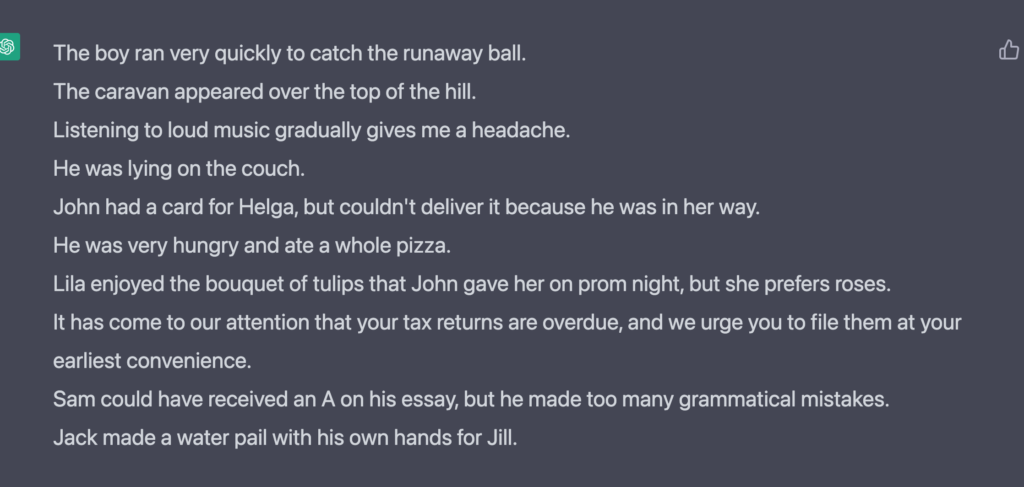Tools are wonderful. We should use them! There are a few tools that editors find extremely helpful. But they’re just not yet ready to replace humans beyond the most basic typo and “wrong word” detection. They can even be wrong about something as seemingly straightforward as consistency. (For example, sometimes a compound should be hyphenated and sometimes not, even in the same piece!) This series isn’t intended to bash AI. I, for one, welcome our new overlords! But the series will show where these electronic editors are most helpful and most destructive. And, maybe, it will show how they are improving over time and how an editor might use them to improve their efficiency and effect.
Why Isn’t AI Ready to Replace Editors?
- English is complex!
- Editing is complex.
- Users have to know what to query.
- Users have to know when the advice creates more errors.
- Each app’s advice isn’t consistent.
More on those points:
- English is complex! A human brain is the ultimate supercomputer. Still today, no other computer has matched its computing power and we’re still a long way from having input all the rules, exceptions, variations, subject standards, regionalisms, and nuances that an editor considers.
- Editing is complex. Editors address concerns like cohesion, sense, logic, liability, bias, permissions, and several dozen others listed in the Professional Editorial Standards of Editors Canada and CIEP’s training standards, among other professional organizations (and my own). Even if you could query AI for every such concern, it doesn’t yet have the judgement to catch all concerns.
- Users have to know what they’re looking for. This is especially true of the new GPT AIs like ChatGPT, which gives different results depending on how you phrase the query.
- Most importantly, users have to recognize bad advice. The sheer volume of rules and exceptions — not to mention voice and audience — matter enormously. For instance, Grammarly advised me to make these changes on the grounds that my articles were incorrect:
AThe human brain isthean ultimate supercomputer. ChatGPT said it was grammatically correct but did have (unnecessary?) suggestions for its flow and accuracy. - Each app’s advice isn’t consistent. In the tests, each app gave a different suggestion each time. Sometimes even when queried the same way repeatedly.
Test Sample of Common Grammar Mistakes
There are so many ways to go about testing systems, but let’s start with an easy one. I looked up Grammarly’s post on “10 Common Grammar Mistakes Writers Should Avoid” and ran it through its own system. How did it perform? Not good! Then I ran that same post through MS Word and ChatGPT. The results are discussed below.
Interestingly, as I said in point 5 above, answers were inconsistent, and not just because I worded queries differently. In each case, I am sharing the best results the software gave over several attempts. Sometimes the best result was the first instance, so it’s not just because they’re learning over time.
Grammarly’s Results
You’d think that the least they could do was make sure their own software caught the examples they wrote, but Grammarly only flagged “really” as unnecessary and “could of” as the wrong word.
![Grammarly suggests "the word file doesn't seem to fit in this context [Your tax returns are overduce. Please file them now.] Consider replacing it with a different one."](http://scieditor.ca/wp-content/uploads/2023/01/Grammarly-edits-itself-file-1024x250.png)
Grammarly did, however, have a few more critiques on the clarity of the entire post. It did catch the “could of” for “could have” in their sample errors and when reviewing only the problem sentence examples, it suggested that “really” was unnecessary, but that’s it. Of the 9 alerts for “correctness” it gave when I tested the whole blog post, none are in the sample error sentences. Note that “really” in the screen capture below has not been flagged.
ChatGPT’s Opinion
Presently, the ChatGPT AI chatbot is getting a lot of attention, so I gave it a try. I will have some encouraging comments about its ability to revise text in a future post, but the sneak peek is that how you tell it what to do (i.e., the request) matters a lot, and then you have to know what is useful and what is detrimental among its replies.
For this post, I ran those same 10 grammar mistakes from Grammarly’s post past the ChatGPT, to see how it compared. Phrasing the question matters a great deal. Several attempts to “explain the grammar errors” returned “there are no grammar errors.” When I tried the prompt: “fix the grammar in this,” it corrected a couple of errors, but when I asked it to explain those errors, it again returned “there are no grammar errors.” What do you think of its “fixed” examples?

When told simply to “copyedit this paragraph” (of the sentences, run together as if a paragraph), it suggested much nonsense:

MS Word’s Grammatical Determination
Word’s terrible grammar checking tool (now found within the “Editor” tool) has improved lately, but it’s not yet ready to fly solo! It flagged a single concern in the sample errors, and it wasn’t strictly right about even that. It wants the comma after Helga deleted, because it thinks it’s not needed to separate the clauses. And that is all!
What Would an Editor Do?
There are many ways to address an error, or an “infelicity” as we politely call them. An editor might make the changes that Grammarly suggested in their blog, or that Word or ChatGPT suggested in their analysis. Or, they might make another change! They might even leave it untouched, if the situation warrants: such as it being in dialogue. Only spoof characters speak with impeccable grammar. The writer might also reject that change just because they don’t like it; something called “stetting”, in editing. Using or rejecting suggestions is most often up to the writer, as their name goes on it.
Sample edits on these common error samples
[Overuse of adverbs] “The boy ran really fast to catch the runaway ball.” Possible solutions are eliminating every third adverb or more, replacing them with synonyms — like speedily, in this case — or leaving it because that’s the author’s style.
[Too many prepositional phrases] “The caravan came over the top of the hill.” Primarily I’d leave this, as it is legitimate grammar and a style that is more readily understood by people for whom English is an additional language. If the writing is starting to sound robotic because of it, we could eliminate some prepositions or turn some into other forms, such as Grammarly’s suggested “The caravan crested the hill” example. It’s important to note the change in tone (voice) this creates, as well as the reading level accessibility of “came over the top of” VS “crested.”
[Ambiguous (“Squinting”) modifiers] “Listening to loud music slowly gives me a headache.” Persnickety editors eliminate the possibility of even the most ludicrous misreadings. (And some texts call for such precision!) But in this example, there may be cogent concerns about misinterpretations that the music is slow rather than the headache being slow to grow, and that’s worth revising. A possible revision that I’d give serious thought to is whether replacing “gives” with “develops”, as Grammarly suggested, is a warranted and defensible change in the writer’s tone/voice. Furthermore, how does that change affect accessibility to the reader based on their language ability (often a function of age)?
[Misuse of lie/lay] “He was laying on the couch.” A simple word confusion that an editor will certainly correct unless lay/lie are in a correct idiom or the client’s style agrees with Garner’s 2009 assessment of the evolution of these meanings as no longer observed except by the most “stalwart snoots.”
[Ambiguous pronoun references] “John had a card for Helga, but couldn’t deliver it because he was in her way.” Maybe in the context Grammarly had in mind, there were other “hes” this could be talking about. In isolation, the gendered names eliminate ambiguity about who is in the way. Without more information about the scene, I wouldn’t change this sentence.
[Comma splices] “He was very hungry, he ate a whole pizza.” Replace the comma with a period or semicolon, depending on the reading ability of the intended audience. (Semicolons are less common and poorly understood.) Grammarly’s suggestion of adding a comma followed by “so” changes the tone a bit more than ideal. It also implies causality, whereas the two observations might be individual, in the vein of “Look how hungry he was. He ate the whole pizza!” It’s easier to imagine someone saying this; it sounds more natural/idiomatic with only the comma change and no additional words.
[Run-on sentences] “Lila enjoyed the bouquet of tulips John gave her on prom night however she prefers roses.” A comma might do some heavy lifting here, after “night.” But starting a new sentence would be better there. The semicolon that Grammarly advised is definitely an option, but the reading difficulty semicolons pose remains (as explained above).
[Using “could of” instead of “could have”] “Sam could of received an A on his essay, but he made too many grammatical mistakes.” The minority whose dialect uses “of” here might one day overtake the rest, but it’s a long way from that stage. Changing this to the standard diction of “could have” is so un-nuanced that it could be part of a standard cleanup macro.
Non-errors
[Wordiness (inflated sentences)] “It has come to our attention that your tax returns are overdue and we urge you to file them at your earliest convenience.” This sounds very bureaucratic, and in that context, I wouldn’t change it. There’s no grammatical error in it and it’s not hard to understand, either. It’s possible to leave it alone if it’s a permissible style and authentic to the writer/brand and the readers’ expectations, but it doesn’t suit most dialogue (fiction or real). If it were a typical human speaking, this would sound more natural with Grammarly’s suggested edit: “Your tax returns are overdue. Please file them now.” However, the “now” part may not be accurate and definitely changes the tone, maybe even the legal implications. I might suggest instead, “as soon as possible” or “when you can,” if I couldn’t get the writer to be more specific.
[Tautologies] “Jack made a water pail with his own hands for Jill.” This may be ambiguous but I disagree that it’s redundant (a tautology). None of this is redundant: a pail is not just for water (as ChatGPT critiqued) and “made” does not duplicate “with his own hands,” as Grammarly argued in its post. He could have made the pail with a CNC or 3-D printer instead of by hand, for starters. Does anyone want to tell ChatGPT this or do we need to maintain some of its flubs to be able to distinguish the bots from humans? What I do wonder about is whether the pail was made of his own hands (as I initially pictured), which would be more like a cup than a pail unless he’s a giant. Most reasonable readers aren’t going to be stumped by this.
Up Next
In future posts, I’ll give ChatGPT a shot at editing for style, flow and concision, not just for grammar. That may seem like a harder task, but it isn’t completely unskilled in this area!
The next post raises the stakes a little less than a full edit; I pitted the AI against a NYT copy editor.
Want to learn more about editing? Start with this free sneak peek at proofreading in which a proofreader (me) explains their thinking as they live-proof a single page of a book. Then take one of our training courses or check out Editing in Word 365 for technical help. And be sure to check out our full list of free resources on how to become an editor as well as our Starter Kit collection.
Thanks to Erin Brenner — another real, live, experienced and credentialled editor — for her comments on an early draft which were quite helpful. Be sure to read her brand new Chicago Guide for Freelance Editors, too!
Human and robot hand picture created by the art bot Dall-E-2 based on the author’s query.






One thought on “Editor Vs AI: Common Grammar Mistakes”